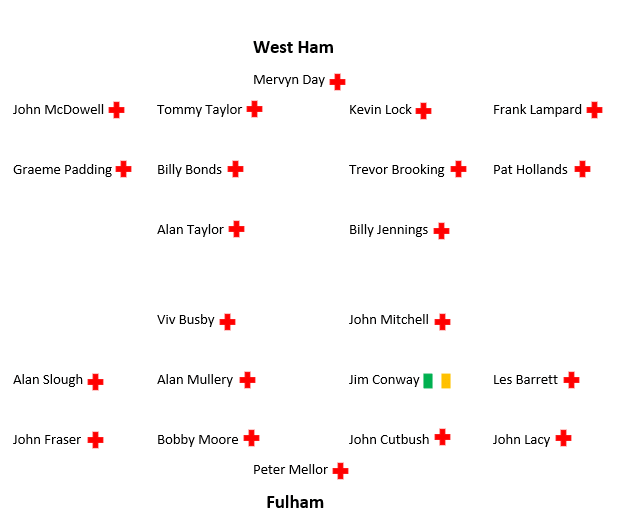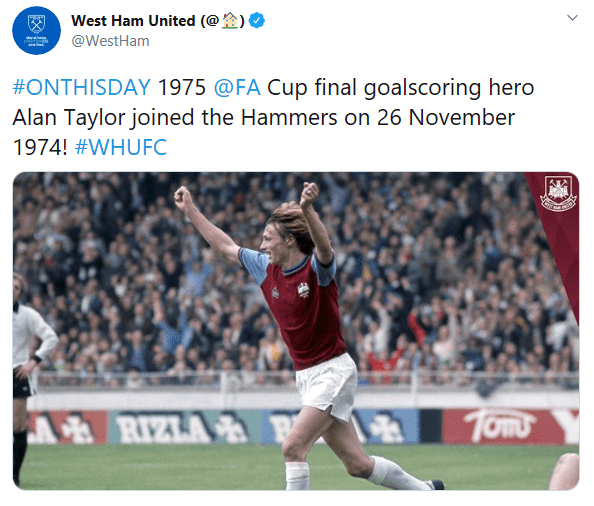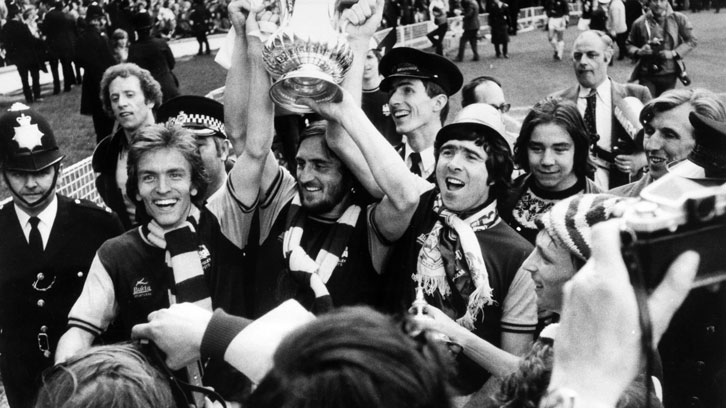1974 was a year of historic change at West Ham.
Club legend, Bobby Moore had joined Fulham (who were in the second division), and John Lyall replaced Ron Greenwood as the club’s manager.
Lyall had been a one club man at West Ham before retiring at the age of 23 due to a knee injury, but the former defender would remain as The Irons’ manager until 1989.
Lyall also won the FA Cup in 1980 and boasted a win percentage of 40%.
Whilst West Ham winning the World Cup is a well-known myth, England winning the FA Cup is relatively unknown to football fans, but it happened just nine years after England’s World Cup triumph.
Being one of four teams to finish on 39 points in the 1974/75 season, it’s fair to say that West Ham had an uninspiring campaign as they finished in 13th place.
Having said that, the East London side added to their trophy cabinet by winning the FA Cup against Fulham in 1975.
It was a game of historical feats for both clubs, in which West Ham became last club with all English players to win the FA Cup.
They had previously won the competition with an all-English team in 1964. It was also Fulham’s first appearance in the FA Cup final.
The Cottagers wouldn’t make another appearance at Wembley until the 2018 play-off final.
Two goals in the space of four minutes from Alan Taylor’s gave West Ham a 2-0 triumph against fellow London side Fulham, and it would prove to be one of West Ham’s most recent trophy successes.
Ahead Of The Game
After beating Ipswich in a semi-final replay, The Hammers’ form in the league suffered as they lost most of their games in the run-up to the final.
Fulham had played eleven games in the cup, including replays. This was a record at the time, but many still regarded Fulham as favourites to win the game.
The two sides had already played each other earlier in the season in the League Cup, as Fulham beat West Ham 2-1 at Craven Cottage.
The second division side boasted the experienced Alan Mullery in midfield and the aforementioned Bobby Moore, who had spent 16 seasons at West Ham, which put him in a position to suss his opposition better than the rest of his teammates.
The Managers
Another key factor was the experience in managers. Fulham’s manager, Alex Stock had been managing for thirty years, whereas West Ham’s manager John Lyall, was into his first nine months as a manager.
The 1975 FA Cup final was a first for both managers. For Fulham, they were at odds of 500-1 to win the FA Cup at the start of the season, so getting to the FA Cup final had already felt like a victory.
The Squads

The Hammers’ squad for the game included well-known names such as Billy Bonds who had never lost a game at Wembley, Trevor Brooking and Frank Lampard, Sr.
Both managers and squad were filled with English players, except Fulham’s midfielder Jim Conway who represented the Republic of Ireland.
One Of Their Own
100,000 people filled Wembley Stadium to see West Ham legend, Bobby Moore play at Wembley for the final time, but for the West London side as his career was coming to an end.
It had seemed to be a bittersweet moment for everyone connected to West Ham to see Moore playing against the side who he was most associated to.
This was because West Ham won the cup, but it was at the expense of Moore who was classed in such high regard by the West Ham and their fans as the club’s best player.
The FA also rewarded him with a statue outside of Wembley stadium after Moore won a fan-voted poll to determine the best player in the last 60 years, which is a testament to how good he really was.
Super Alan Taylor

In what was Lyall’s first ever managerial job in football, he signed eventual FA Cup hero Alan Taylor from fourth division side, Rochdale. Taylor’s 8 goals in 25 games was enough for West Ham to pay £45,000 for the striker.
Despite not figuring in the team on a regular basis, Alan Taylor made his mark in the FA Cup.
Scoring 6 of the Hammers’ 13 goals in the cup, (all of which were braces), Taylor was a crucial part in West Ham’s triumph as he scored against fellow London sides Arsenal and Fulham, both in 2-0 victories.
It’s been decades since West Ham have won a trophy, but fans of the East London club will be hoping that the current squad can end their drought by winning a cup just like the 1974/75 squad did.
Image Credit: Bob Thomas.




